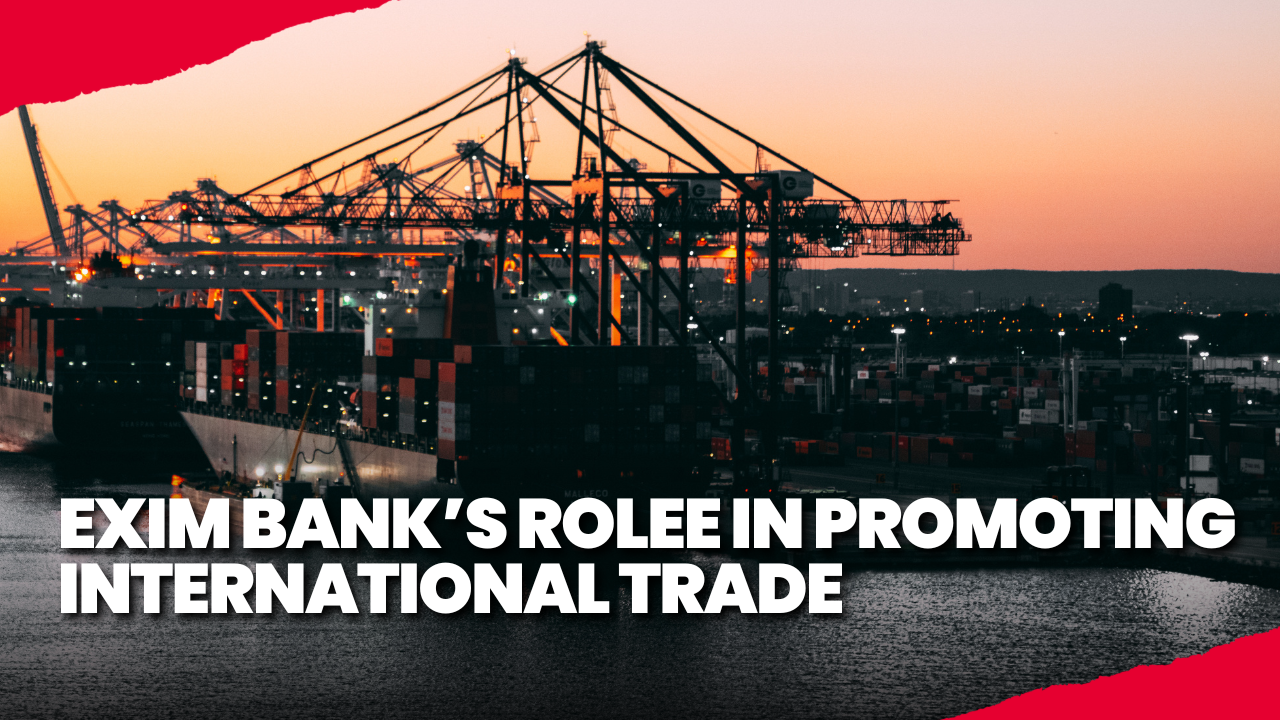
Companies are increasingly trying to expand internationally. But this comes with challenges, like financial risks, complicated rules, and getting the money you need. This is where Export-Import (Exim) banks come in very handy. Exim Bank were created to help trade between countries. They provide a range of financial services that assist companies in lowering their risks and getting the money they need to do business throughout countries.
We will discuss the role of Exim Bank in supporting global trade, Exim Bank functions, and how these contribute to economic growth and business expansion.
Role of Exim Bank in the International Trade
The main job of the Exim Bank is to make foreign trade easier by giving exporters and buyers money. Foreign exchange (Exim) banks help lower the risks of doing business internationally by providing credit, insurance, and guarantees. These can include foreign sellers who don’t pay, currency changes, and trouble getting capital.
One of the most important things that the role of Exim Bank does is to
help businesses get the money they need to succeed on a global scale. This is particularly important for small and medium-sized businesses (SMEs).
Exim banks help businesses get past financial problems by giving loans to exporters. This helps their growth into new markets.
To further encourage commercial lenders to lend to exporters and lower their own risk, Exim banks provide loan guarantees. One of the most important things the Exim Bank does is guarantee loans so that companies may afford to trade internationally.
Exim Bank Functions
The primary goal of the Exim Bank is to safeguard the economic interests of both importers and exporters by facilitating international commerce. The primary functions are summarized below:
Export Credit
An important Exim Bank function is export credit. As a result, businesses may send products or provide services to customers in other countries without having to wait for quick payment. Export financing allows companies to develop their trade operations and execute larger orders even when cash flow is limited.
Insurance against trade risks
Foreign purchasers’ possible non-payment or interruption caused by instability in the buyer’s nation are two examples of these risks. Exim banks give their customers the assurance of being covered by any losses in the case of a trade.
Loan Guarantees for Exporters
Exim banks additionally function as loan guarantee agencies for commercial banks that provide money to exporters. Because of its essential position, even companies with little collateral may get the money they need to run their operations. Lenders are less risky, and exporters have more access to finance owing to loan guarantees.
Advisory Services
In addition to their financial products, Exim banks provide guidance services to businesses. These services cover topics such as market access, legislation, and risk management in international commerce. By simplifying the occasionally complex process of international trade, these services create a way for companies to more easily enter new international markets.
Also Read This: Bills of Exchange: Types, Features, and Business Importance
Impact of Exim Bank
Exim Bank promotes economic growth as well as company growth. Export banks encourage exports, which boosts production, jobs, and foreign currency. Export banks help a nation’s economy by increasing exports.
Export credit, insurance, and loan guarantees help businesses grow, enter new markets, and increase production. This boosts economic activity.
Because SMEs have trouble getting traditional loans for foreign trade, this is their main concern. By providing financial resources to these companies, Exim Bank supports innovation, job creation, and global competitiveness.
What are the challenges facing Exim Banks?
- Exim banks confront global competition, changing trade rules, and political instability.
- The increasing automation of international commerce requires the implementation of new technology by Exim institutions.
- Financial services for international commerce must undergo transformation at EXIM banks.
- Blockchain technology, artificial intelligence, and financial technology advancements might have an integral part in future responsibilities.
- The continued significance of Exim banks to the global economy depends on their ability to adapt to these shifts.
Wrapping It Up
When it comes to the international market, companies depend on the Exim Bank and its functions. Businesses are able to take part in international commerce with the support of Exim banks, which provide export financing, insurance, loan guarantees, and consultancy services. These functions have a positive impact on exporters and the whole economy, helping it grow and survive. The role of export credit institutions (Exim banks) in promoting the success of multinational businesses will change in response to the dynamic nature of international commerce.
FAQs
Yes, RBI controls it. Exports from India are the main focus of the bank’s lending activities. This includes assisting both international customers and Indian suppliers with the export of developmental and building projects, equipment, products, and services.
The Indian government owns 100% of Exim Bank.
Also Checkout Our YouTube Channel: @limeinstituteofexportimport






